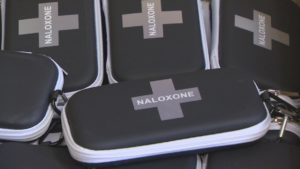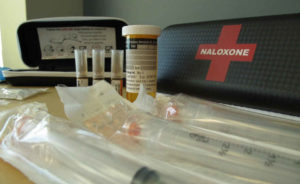Take-home naloxone program prevented 226 deaths over 10 months in 2016

The rapid expansion of a program that hands out an overdose-reversing drug significantly reduced the number of fentanyl-related deaths in 2016 in B.C., according to a new study.
Findings say 226 lives were saved through the take-home naloxone program, which distributes kits with the drug for free across the province.
The study, published by The Lancet Public Health on Tuesday, said that number accounts for 26 per cent of all possible overdose-related deaths from January through October 2016. One death is estimated to have been prevented for every 10 kits used.
The study stemmed from the first use of a math-based model, developed by the BC Centre for Disease Control (BCCDC) and the University of British Columbia, to estimate how well public-health interventions — such as the kits — help prevent opioid overdose deaths.
“Clearly, fast and wide distribution of naloxone is key,” Dr. Mark Gilbert, a BCCDC medical director, said in a statement.
“We hope other jurisdictions in Canada and the world will take note and use our experience to make their own harm-reduction programs as effective as possible.”

B.C. recently expanded its take-home kit program by handing them out at pharmacies. Around 1,900 kits were sent to 220 pharmacies in December.
Kits are also available at health centres, hospitals and safe consumption sites.
The B.C. Coroners Service says 1,446 people died of fatal overdoses in the province last year — the highest number of illicit-drug fatalities in provincial history.
Coroners’ statistics show 102 people died of suspected illicit-drug overdoses in February, down 16 per cent from the same month last year.
More than 74,000 naloxone kits have been passed out in B.C. since the take-home program launched in 2012.
The province said it handed out 220 per cent more naloxone kits in 2016 than the previous three years combined.


